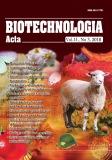ISSN 1995-5537

"Biotechnology" journal V. 5, No. 3, 2012
Р. 112-118, Bibliography 31, Ukrainian.
Universal Decimal classification: 612.017.1.579.861.2
L. M. Skivka, Yu. V. Shvets, O. G. Fedorchuk, N. M. Khranovska, V. V. Pozur, N. V. Senchilo
Educational and Scientific Center «Institute of Biology», Taras Shevchenko National University, Kyiv
Kavetsky Institute Experimental Pathology, Oncology and Radiobiology, Kyiv
National Cancer Institute, Kyiv
To stimulate maturation of dendritic cells in vitro adjuvant receptors agonists are used, including Pathogen Associated Molecular Patterns: lipopolysacharide, CpG DNA, peptidoglycan etc. The aim of the work was to perform the comparative analysis of the ability of biopolymers of Staphylococcus aureus: lipoteichoic acid, teichoic acid and peptidoglycan to stimulate phenotypic and functional maturation of human monocyte-derived dendritic cells in vitro. It was shown that Pathogen Associated Molecular Patterns with lipid constituent caused more expressed phenotypic maturity of dendritic cells. All of biopolymers used in the investigation induced functional maturation of dendritic cells, but at the different concentration: lipoteichoic acid – at the minimal concentration (0.2 μg/ml), teichoic acid and peptidoglycan – at the maximal (2 μg/ml). All investigated S. aureus biopolymers did not exert toxic effect on dendritic cells and could be used for stimulation of its maturity in vitro.
Key words: dendritic cells, teichoic acid, lipoteichoic acid, peptidoglycan.
© Palladin Institute of Biochemistry of National Academy of Sciences of Ukraine, 2008

